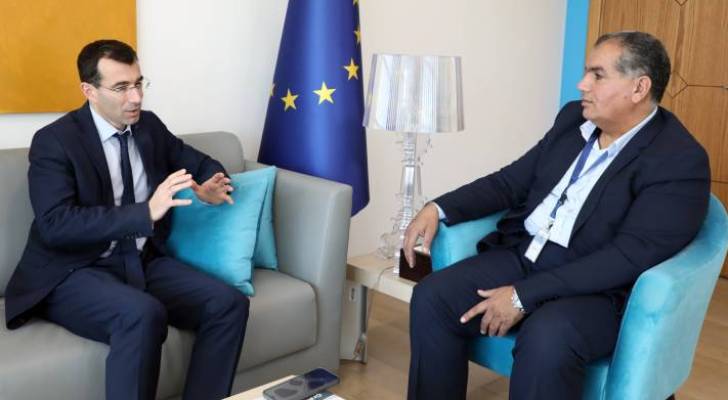European Union’s ambassador to Jordan, Pierre-Christophe Chatzisavas (left)
EU ambassador: Forced displacement of Palestinians constitutes war crime
The European Union’s ambassador to Jordan, Pierre-Christophe Chatzisavas, reaffirmed the EU’s firm stance on the Palestinian issue, stressing that any forced displacement of Palestinians from the occupied territories constitutes a war crime under international law.
In a press interview, Chatzisavas reiterated that Gaza is an integral part of the occupied Palestinian territories and must be included in any future Palestinian state.
He stressed that the two-state solution remains the only viable path to achieving security and stability in the region, a position the EU is firmly committed to maintaining.
The ambassador also highlighted the deep-rooted ties between the EU and Jordan, noting that their partnership has spanned decades, built on mutual respect and cooperation.
He pointed out that the EU-Jordan Association Agreement, in effect for over 20 years, is one of the most advanced agreements of its kind, including a free trade deal that is continuously updated to enhance economic collaboration.
On Jan. 29, the EU and Jordan signed a new comprehensive strategic partnership, under the patronage of King Abdullah II, following six months of negotiations. This partnership focuses on five key areas: politics and security, investment and economic development, human development, migration and asylum, and military and security cooperation.
The EU aims to strengthen military collaboration with Jordan while combating terrorism, organized crime, and drug trafficking, in addition to supporting the rule of law and political dialogue.
Chatzisavas underscored the EU’s commitment to expanding trade with Jordan, emphasizing that the European market, with its 450 million consumers, presents a significant opportunity for diversifying Jordanian exports. He also announced a review of simplified rules of origin to further support Jordanian products and boost exports to Europe.
Regarding investments, the ambassador revealed that the EU has launched a €3 billion support package for Jordan. This includes €1 billion in concessional loans to help stabilize the country's finances, €600 million in direct budget support grants, and €1.4 billion in investments, in cooperation with the European Investment Bank, to fund major development projects. Among these, the EU will partially finance Jordan’s national water carrier project through grants and soft loans.
Addressing the refugee crisis, Chatzisavas reaffirmed the EU’s commitment to supporting Jordan in hosting Syrian refugees, as well as funding UNRWA operations, with an annual allocation of €90 million.
On the situation in Gaza, the ambassador disclosed that the EU has allocated €130 million for humanitarian aid and has been involved in evacuating hundreds of children from Gaza for medical treatment in EU countries. He also praised King Abdullah II’s initiative to host 2,000 injured Palestinian children for treatment in Jordan.
Responding to "Israeli" Prime Minister Benjamin Netanyahu’s comments on the potential establishment of a Palestinian state in Saudi Arabia, Chatzisavas reiterated the EU’s firm position: Gaza, the West Bank, and East Jerusalem are occupied Palestinian territories and must form part of a sovereign Palestinian state within the 1967 borders.
The ambassador concluded by affirming Jordan’s status as a key strategic partner for the EU in the region, emphasizing the continuation of strong political, economic, and security cooperation in the interest of both sides.




